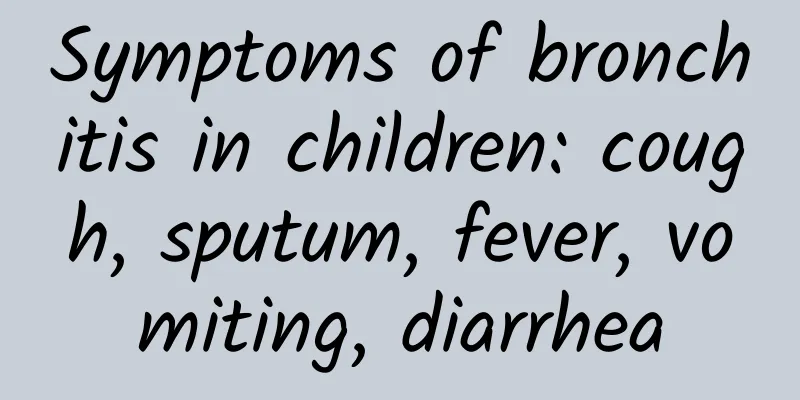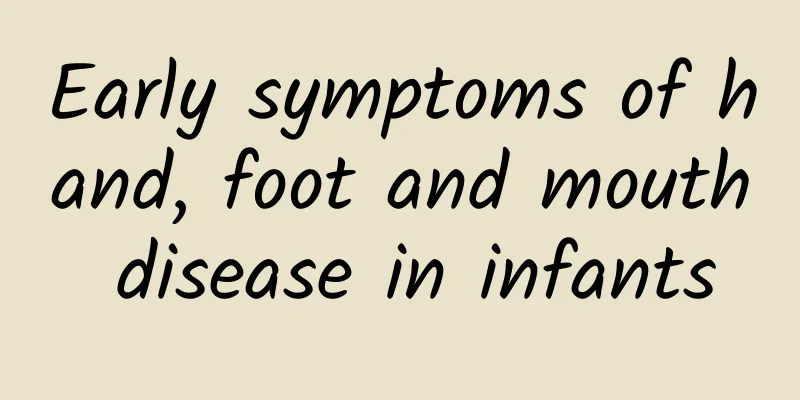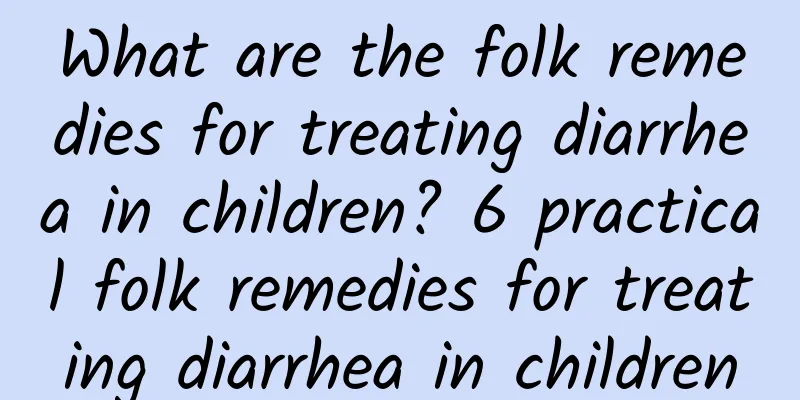What are the factors that cause indigestion in babies? What is the best thing for babies to eat when they have indigestion?

|
During the Spring Festival, the reunion of relatives and friends, or improper feeding by parents, will inevitably lead to the problem of children eating too much. After eating too much, many children will vomit, have abdominal pain or even diarrhea because of their diet. So, what is the cause of indigestion in babies? Babies have delicate internal organs, their spleen and stomach functions are not perfect, and their diet is difficult to control. Excessive pampering and improper feeding at home can easily cause gastrointestinal dysfunction. Children will experience indigestion (food damage) such as abdominal distension, vomiting, loose and sour stools, and large amounts of undigested food residues. In addition to improper feeding, gastrointestinal inflammation, abuse of antibiotics, cold weather, low body resistance, and cold stomach can also cause indigestion. Long-term indigestion in children will lead to insufficient nutrient intake, poor digestion and absorption, and affect growth and development. Especially for children under 3 years old, this stage is the period of most vigorous brain development and a critical period for determining intelligence level. If the digestive function cannot be improved in time, it will affect the absorption of nutrients, which will inevitably affect the development of the brain and regret it for life. Therefore, correcting eating behavior is still fundamental. Do not be partial to food, do not be greedy, do not overeat, and strictly control snacks. Daily diet should be regular and quantitative, and pay attention to balanced nutrition. As long as you stick to it, the child's digestive function will slowly return to normal! Since infants have poor digestive ability, parents should feed them food that they can digest, absorb and accept according to their age. On the one hand, parents should gradually change their diet from liquid to semi-liquid (such as rice soup, paste food, porridge) and solid food (such as soft rice, bread, etc.) according to their age. Infants under 3 months old have different digestive juices from adults and are relatively poor at digesting starch, so special attention should be paid. For infants under 2 years old, the added complementary food must be rotten, fine and soft. For example, vegetables can be chopped, rotten and made into vegetable puree. 2-3 older babies (baby food) already have 16-20 milk teeth, and the food can be a little thicker. At the same time, whole melon seeds, beans, peanuts, jelly and other foods are very dangerous to infants (children's food) and may be swallowed into the organs, so be careful and grind them into powder and break them before eating. Children's digestive organs are not fully developed, digestive juices are insufficiently secreted, enzyme function is imperfect, gastrointestinal mucosa is tender, and digestive function is weak. If parents cannot feed their children correctly and feed their children, the quality and quantity of their diet will be inappropriate, which will damage gastrointestinal dysfunction. Children will experience indigestion (food damage) such as abdominal distension, vomiting, loose and sour stools, and a large amount of undigested food residues. In addition to improper feeding, gastrointestinal inflammation, abuse of antibiotics, cold weather, low body resistance, and cold stomach can also cause indigestion. Long-term indigestion in children will lead to insufficient nutrient intake, poor digestion and absorption, and affect growth and development. Especially for children under 3 years old, this stage is the period of most vigorous brain development and a critical period for determining intelligence level. If the digestive function cannot be improved in time, it will affect the absorption of nutrients, which will inevitably affect the development of the brain and regret it for life. Understand the causes of infant indigestion and take effective measures to solve it in time. So, what about infant indigestion? If the baby has indigestion and only has mild diarrhea, no antidiarrheal medication is needed. The baby can eat carrot soup, fish protein powder, scorched rice soup and scorched rice porridge, and can be fed small amounts several times. Ginger can help digestion, and ginger can detoxify, which is beneficial for preventing and controlling diarrhea. It can be taken daily, and vitamin B1, vitamin C, and lactase can be taken 3 times a day. 1. Take carrot soup, 2-3 times a day, 2-3 tablespoons each time; take applesauce (take an apple, wash, peel and core it, cut it into small pieces, put it in a bowl, add a small amount of sugar, steam it, and mash it after steaming). Because carrots and apples contain pectin, they can form stools and absorb harmful substances in the intestines, helping to cure diarrhea. 2. Add fish protein powder to rice soup, 5 grams per day, 1-2 times. Babies over half a year old can eat fish protein porridge or rotten noodles. Because fish protein powder has high protein quality, low fat content, and no lactose, it is particularly beneficial for infant diarrhea. Mild diarrhea usually recovers within 3-5 days. 3. Scorched rice soup and scorched rice porridge are cooked with rice or rice flour, and can be fed in small amounts multiple times. Because rice contains carbohydrates, it is the easiest to digest and absorb, and it is not easy to ferment or bloat without lactose. The protein contained in rice does not have an allergic reaction. The focal part can absorb harmful substances, which is helpful to control diarrhea. 4. Shan charcoal or Paojiang charcoal is made by removing the core of Shanhao or peeling Paojiang, then frying it into charcoal and grinding it into fine powder. Take 0.3-0.6 grams each time, 3 times a day, with warm water and a little sugar. Shanhao can help digestion, ginger can detoxify, and it is beneficial to prevent and control diarrhea. 5. Take vitamin B1, vitamin C and lactase 3 times a day, 1 tablet each time, crush and mix with water to feed evenly, and take oral rehydration at the same time. Because vitamin B1 can promote sugar metabolism and prevent acid accumulation and gas, vitamin C lactase can increase resistance and help digest milk. They are commonly used drugs to control diarrhea. |
Recommend
What fruits are good for adults with hand, foot and mouth disease?
During the period of hand, foot and mouth disease...
What medicine can children take for diarrhea?
It is autumn now and the weather is getting colde...
Early symptoms of ADHD in babies
Early symptoms of ADHD in infants may include dif...
How to prevent kidney disease in children
How to prevent kidney disease in children? The ha...
What is neonatal jaundice? Do these three things to prevent neonatal jaundice
For many new mothers, after the ten-month pregnan...
Is polio treatable?
Polio cannot be completely cured, but early diagn...
What to do if your baby has eczema on his face? What are the treatments for eczema on your baby's face?
When eczema appears on the baby's face, the m...
Baby cough can cause allergic rhinitis
A baby's cough may cause allergic rhinitis, b...
Do you know some tips on the prevention and treatment of Kawasaki disease?
What are the basic knowledge about the prevention...
Can severe mumps be cured?
Mumps refers to a disease caused by excessive acc...
What are the differential diagnoses for polio?
Many patients with polio first think of the diffe...
Can patent ductus arteriosus be completely cured?
Can patent ductus arteriosus be completely cured?...
Can babies with high jaundice take Yinzhihuang oral liquid?
When the infant has high jaundice, you can consid...
Choice of staple food for children with pneumonia
What should children with pneumonia eat? During t...
What should parents do when their children have seizures?
Children's convulsions are a common emergency...









